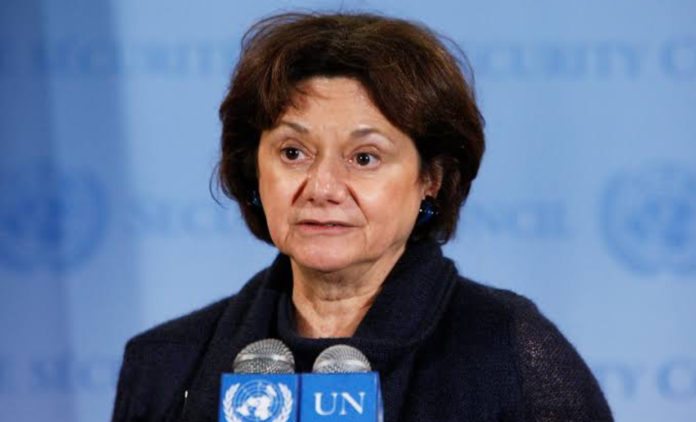New Delhi (NVI): The United Nation political affairs chief, Rosemary DiCarlo, warned of the risks amplified by COVID-19 to push countries into violence, including the erosion of trust in public institutions, human rights violations, and tensions around peace processes.
Speaking in a briefing on the impact of COVID-19 on international peace and security, Rosemary said, “The breakdown in public trust although was a problem before the pandemic, now has the potential to drive instability in settings where people perceive authorities have not addressed COVID-19 effectively or have not been transparent about its impact.”
The aggravation of certain human rights challenges during the pandemic can fuel the conflict, she warned.
DiCarlo stated that, discrimination in access to health services have increased manifold. Gender-based violence, particularly in the home, surged around the world as COVID-19 lockdowns became necessary.
Many of the economic costs are disproportionately affecting women, who are over-represented in sectors hardest hit by shutdowns and layoffs and cuts, she added.
Meanwhile, there are also growing limits being placed on the media, civic space and freedom of expression, with social medial platforms being used to spread disinformation about the pandemic. And there has been a rise in stigma and hate speech, especially against migrants and foreigners, DiCarlo said.
“Tensions around decisions to postpone election or proceed with a vote – in the COVID-19 era pose still other risks to political and peace processes,” she added.
Furthermore, there has not been a significant change in the dynamics of armed conflicts as a result of the pandemic. “As seen in the Sahel, the risk remains that parties use the uncertainty created by the pandemic to their advantage. We cannot but be concerned for the future,” she warned.
In the short term, the pandemic could also derail fragile peace processes and conflict prevention initiatives due to restrictions on travel and in-person contacts. The United Nations’ own ability to support political processes has been limited by such restrictions, she said.
To mitigate COVID-related risks in situations of armed conflict and prevent the possible deterioration of situations, the collective and individual engagement of the members of the Security Council and member states, is indispensable, she insisted.
Thereafter, the same holds true for preventing other situations from reversing gains. “The better the global response to the pandemic, the better our prospects for the prevention, management and resolution of conflicts around the world,” DiCarlo stated.
Jean-Pierre Lacroix, Under-Secretary-General for peace operations also said countries where peacekeepers are deployed, suffer from weak health and governance structures, and a lack of the resources required to combat the pandemic.
He added that in these environments, the effects of COVID-19 can undermine governance and local institutions and prompt a return to inter-communal conflict and the combined effects also negatively impact mandate implementation.
“Helping to prevent and contain the spread of the virus where peacekeeping operations are deployed is, therefore, not only a moral imperative, but also a political priority as well as an operational requirement,” he assured.
To this end, he said a number of measures have been put in place to prevent and contain the spread among field personnel.
“The COVID-19 pandemic undoubtedly had a significant impact on the conduct of our peacekeeping operations,” he said, adding that, the Juba peace talks on Sudan, whose parallel negotiating tracks were moved online and eventually resulted in a peace agreement between transitional authorities and participating armed groups.
-RJV






